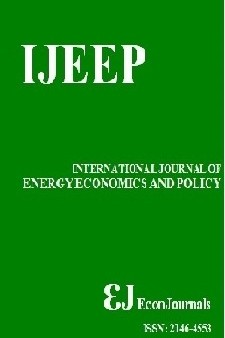Modelling Gasoline Demand in Ghana: A Structural Time Series Analysis
Modelling Gasoline Demand in Ghana: A Structural Time Series Analysis
UEDT Total Factor Productivity (TFP), Gasoline Demand,
- Başlangıç: 2011
- Yayıncı: İlhan ÖZTÜRK
Modelling Gasoline Demand in Ghana: A Structural Time Series Analysis
Forecasting Electricity Prices in Deregulated Wholesale Spot Electricity Market - A Review
Girish Godekere Panchakshara MURTHY, Vijayalakshmi SEDİDİ, Ajaya Kumar PANDA, Badri Narayan RATH
Mortaza Zahedi Department of Agronomy and Plant Breeding
Mortaza ZAHEDİ, Hamid Reza ESHGHİZADEH, Farzad MONDANİ
Towards a UTAUT-based Model for the Intention to use Solar Water Heaters by Libyan households
Ahmed Mohamed SALEH, Asmaddy Bin HARİS, Nursilah Bint AHMAD
An Investigation of Multidimensional Energy Poverty in Pakistan: A Province Level Analysis
Falak SHER, Akhtar ABBAS, Rehmat Ullah AWAN
Energy Consumption and Real GDP in Iran
Ali Akbar Naji MEİDANİ, Maryam ZABİHİ
A Seasonal Analysis of Potential Wind Power for Armidale NSW, Australia
Yasser MAKLAD, Rex GLENCROSS-GRANT
Corporate Financing and Efficiency of Indigenous Energy Firms in Nigeria: A Literature Review
